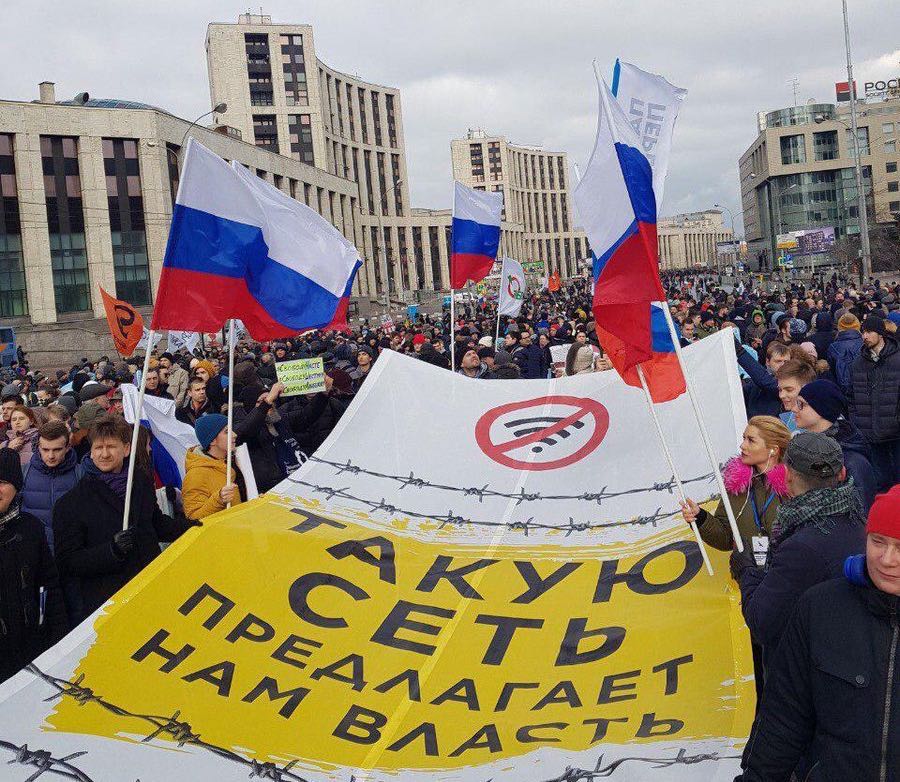Roskomnadzor
-
Op zoek naar nieuws omzeilen Russen blokkade sociale media
Om de informatie over de oorlog in Oekraïne te controleren is de Russische overheid begonnen met het blokkeren van de toegang
... -
Mediavrijheid na militaire censuur totaal om zeep geholpen
Kritische meningen en onafhankelijke berichtgeving over de oorlog in Oekraïne worden in Rusland in rap tempo gesmoord.
... -
'Classic Censorship': Kremlin's next move against press freedom
The crackdown on the last remnants of Russia's independent journalism continues. State censor Roskomnadzor ordered media
... -
Apple, Google en Telegram zwichten onder druk van het Kremlin
Apple en Google verwijderden na sommering van de Russische overheid Aleksej Navalny's 'Slim stemmen' app uit hun app stores. Het was
... -
Endless registers are a backdoor to censorship
The Kremlin's growing obsession with lists and registers to control the population is a mix of Chinese social control and fear of flying. If you are not in a register in Russia, you don't exist, argues Andrei Soldatov, investigative journalist specialised in security services. In effect this super-bureaucratic tool has become a new form of censorship.by Andrei Soldatov -
Can Russia's craving for digital sovereignty succeed?
YouTube, twitter, Facebook: international social media are an important source of information in Russia. But state watchdog Roskomnadzor is tightening the screws and the Duma adopts laws that will curb foreign internet providers. Russia strives for a 'sovereign internet' to eliminate foreign influence and control opposition. Roskomnadzor's slowing down of twitter was a mess, but can Russia in the future technically isolate its population from the world?by Alena Epifanova -
Is tightening control via 'Sovereign Splinternet' in Russia possible?
Russia has been working on the possibility to close the country off by creating a 'sovereign Ru-net', looking at the Chinese example. Experts concluded that it is too late to seal off Russia, but Alena Epifanova from the German think tank DGAP points to the possibilities to seriously hamper internet access for business and civil society.by Alena Epifanova -
Russia’s Sovereign Internet Law Will Kill Innovation
The Kremlin’s domestic policy bloc tries to run Russia as a corporation. It’s not surprising, therefore, that they have resorted to using deep packet inspection (DPI) technology, a corporate method of internet control, writes Alexandra Prokopenko for Carnegie Moscow. The new internet law is driven by anxiety about growing discontent in society, but instead it will drag Russia down.by Alexandra Prokopenko -
Google maakt onder Russische druk de Krim deel van Rusland
Wegens druk van de Russische overheid is het Amerikaanse Google akkoord gegaan met censuur en de wijziging van zijn kaarten. Zo is
... -
Testcase Telegram: will Putin be Stolypin or one of the Kims?
The ban on the messaging app Telegram demonstrates once again that Russia's regime is committed to subordinating business interests
... -
Telegram: de digitale sovjetkeuken van 2018
De pogingen van de Russische staat om de berichtendienst Telegram te blokkeren, zijn tot nu toe mislukt. Waarom slaagt het ‘digitale verzet’ via
... -
The Kremlin’s VPN ban has KGB roots
The new internet law signed by Putin will force providers to enforce the state's blacklisting of internet sites. The ban on VPN's
...

